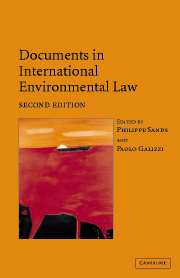Book contents
- Frontmatter
- Contents
- Preface
- PART I General instruments
- PART II Atmosphere
- PART III Oceans: global
- PART IIIB Oceans: regional
- PART IV Freshwater resources
- PART V Biodiversity
- PART VIA Hazardous substances and activities: nuclear
- PART VIB Hazardous substances and activities: pesticides
- PART VIC Hazardous substances and activities: waste
- PART VII Human rights and the environment
- PART VIII War and the environment
- PART IX Trade and the environment
- PART X Environmental impact assessment and access to information
- PART XI Liability for environmental damage and breaches of environmental obligations
- 42 International Convention on Civil Liability for Oil Pollution Damage, 27 November 1992
- 43 International Convention on the Establishment of an International Fund for Compensation for Oil Pollution Damage, 27 November 1992
- 44 Articles on the Responsibility of States for Internationally Wrongful Acts, adopted by the International Law Commission at its fifty-third session, 2001
- 45 Convention on Civil Liability for Damage Resulting from Activities Dangerous to the Environment, 21 June 1993
- 46 International Convention on Liability and Compensation for Damage in Connection with the Carriage of Hazardous and Noxious Substances by Sea, 3 May 1996
- PART XII The Antarctic
46 - International Convention on Liability and Compensation for Damage in Connection with the Carriage of Hazardous and Noxious Substances by Sea, 3 May 1996
Published online by Cambridge University Press: 05 June 2012
- Frontmatter
- Contents
- Preface
- PART I General instruments
- PART II Atmosphere
- PART III Oceans: global
- PART IIIB Oceans: regional
- PART IV Freshwater resources
- PART V Biodiversity
- PART VIA Hazardous substances and activities: nuclear
- PART VIB Hazardous substances and activities: pesticides
- PART VIC Hazardous substances and activities: waste
- PART VII Human rights and the environment
- PART VIII War and the environment
- PART IX Trade and the environment
- PART X Environmental impact assessment and access to information
- PART XI Liability for environmental damage and breaches of environmental obligations
- 42 International Convention on Civil Liability for Oil Pollution Damage, 27 November 1992
- 43 International Convention on the Establishment of an International Fund for Compensation for Oil Pollution Damage, 27 November 1992
- 44 Articles on the Responsibility of States for Internationally Wrongful Acts, adopted by the International Law Commission at its fifty-third session, 2001
- 45 Convention on Civil Liability for Damage Resulting from Activities Dangerous to the Environment, 21 June 1993
- 46 International Convention on Liability and Compensation for Damage in Connection with the Carriage of Hazardous and Noxious Substances by Sea, 3 May 1996
- PART XII The Antarctic
Summary
Editorial note
The IMO's 1996 International Convention on Liability and Compensation for Damage in Connection with the Carriage of Hazardous Substances and Noxious Substances by Sea (1996 HNS Convention) aims at regulating liability and compensation to persons who suffer damage caused by incidents during the carriage by sea of hazardous and noxious substances. The Convention provides a two-tiered system of liability and compensation similar to the 1992 International Convention on Civil Liability for Oil Pollution Damage and the 1992 International Convention on the Establishment of an International Fund for Compensation for Oil Pollution Damage.
Damage is defined in Article 1(6) and includes ‘loss or damage by contamination of the environment caused by the hazardous and noxious substances, provided that compensation for impairment of the environment other than loss of profit from such impairment shall be limited to costs of reasonable measures of reinstatement actually undertaken or to be undertaken’ (Article 1(6)(c)).
The approach of the HNS Convention follows the 1992 CLC. Chapter II establishes a regime of strict liability for ship owners and a list of defences to liability, rules for joint and several liability for damage that is not reasonably separable by ship owner (Articles 7 and 8). Article 9(1) limits the ship owner's liability to specified amounts; Article 9(2), however, imposes no limit to liability if the ship owner intended to cause damage or acted recklessly with knowledge that damage would result. Ship owners are required to maintain a compulsory insurance or other financial security (Article 12).
- Type
- Chapter
- Information
- Documents in International Environmental Law , pp. 1263 - 1302Publisher: Cambridge University PressPrint publication year: 2004
- 2
- Cited by



